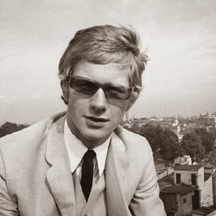Andrew Loog Oldham (born 29 January 1944) is an English record producer, talent manager, impresario, and author. He was manager and producer of the Rolling Stones from 1963 to 1967, and was noted for his flamboyant style. (More from Wikipedia)
Small Faces had a rocky start with Decca Records but eventually began working under one of England’s top producers, Andrew Loog Oldham – who had worked with the Rolling Stones, Marianne Faithfull, and others – and signed them as the top act in his new company, Immediate Records. Their first album with that label, Small Faces – a self-titled album like their debut effort with Decca, Small Faces – was an instant hit in mid-1967 and included a song that even made the charts in the U.S., “Itchycoo Park”.
(April 2014)
* * *
Kim Fowley always wanted to be where the action was, so he relocated for a period of time to London by late 1963. One of the first fruits of his sojourn there might have been a rollicking cover version by Bo and Peep of the Sonny James/Tab Hunter romantic ballad “Young Love” that was released on Decca Records in 1964 not long after Fowley arrived in the UK. The long-time Rolling Stones producer Andrew Loog Oldham was on hand, and it is clear from the record that the studio was jammed with people. Rumored to be among those participating in the recording are Mick Jagger (and perhaps other Stones), Gene Pitney and Kim Fowley. The song is included on the Pebbles, Volume 6 LP and the English Freakbeat, Volume 6 CD.
There is no question that Kim Fowley was there for the peculiar flip side of the Bo and Peep single, “The Rise of the Brighton Surf”, which is included as a CD bonus track on English Freakbeat, Volume 6. Andrew Loog Oldham and Kim Fowley are listed as the, uh, songwriters; and that is Fowley doing the vocalizing on a reworking of “The House of the Rising Sun” as a paean to the English coastal resort town of Brighton with lyrics that (as Greg Shaw says in the liner notes) appear to have been made up on the spot.
(January 2015/1)
* * *
Anyway, Mick Jagger was about the only member of the band who was generally well known by name among the kids that I knew, with Keith Richards less so. Actually he wasn’t even Keith Richards in the early part of the band’s history; as explained in Wikipedia: “After the Rolling Stones signed to Decca Records in 1963, their band manager, Andrew Loog Oldham dropped the ‘s’ from Richards’ surname believing ‘Keith Richard’ in his words ‘looked more pop’. In the early 1970’s, Richards re-established the ‘s’ in his surname.”
* * *
Their second single was actually a Lennon/McCartney song, “I Wanna Be Your Man”; from Wikipedia: “According to various accounts, either the Rolling Stones’ manager/producer Andrew Loog Oldham or the Rolling Stones themselves ran into [John] Lennon and [Paul] McCartney on the street as the two were returning from an awards luncheon. Hearing that the band were in need of material for a single, Lennon and McCartney went to their session at De Lane Lea Studio and finished off the song – whose verse they had already been working on – in the corner of the room while the impressed Rolling Stones watched.”
* * *
The guitar on “Satisfaction” was run through a new toy that Keith Richards had purchased, a Gibson Maestro fuzzbox; the intention by Mick and Keith was to replace the guitar with horns. But according to Wikipedia, they were outvoted by the other members of the Rolling Stones, as well as their manager Andrew Loog Oldham and sound engineer Dave Hassinger; and the song was released as it was. As a result, Gibson sold completely out of fuzzboxes by the end of the year, and the fuzzbox sound became an integral part of the sound of the 1960’s.
* * *
Their manager and producer Andrew Loog Oldham kept emphasizing to the two of them that there just weren’t that many obscure great songs out there. Although Mick Jagger disputes that it was really this literal, Keith Richards relates their first songwriting experience this way: “So what Andrew Oldham did was lock us up in the kitchen for a night and say, ‘Don’t come out without a song.’ We sat around and came up with ‘As Tears Go By’. It was unlike most Rolling Stones material, but that’s what happens when you write songs, you immediately fly to some other realm. The weird thing is that Andrew found Marianne Faithfull at the same time, bunged it to her and it [‘As Tears Go By’] was a f--kin’ hit for her – we were songwriters already! But it took the rest of that year to dare to write anything for the Stones.”
(May 2015)















